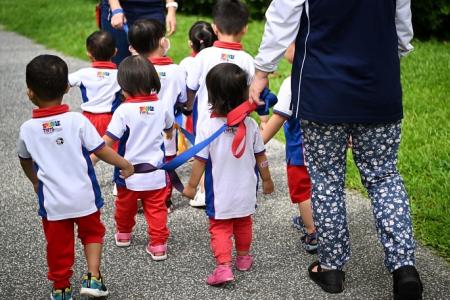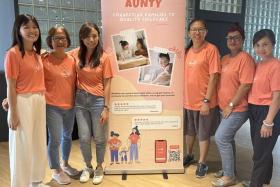40,000 new infant care, childcare places to open in next 5 years
There will be close to 40,000 new infant care and childcare places made available by the Early Childhood Development Agency (ECDA) and five anchor operators, from 2025 to 2029.
These will include about 6,000 new infant care places to cater to increased demand.
Minister for Social and Family Development Masagos Zulkifli announced this at the Early Childhood Celebrations event, which was held at the Sands Expo and Convention Centre on Nov 2.
He said this will ensure that government-supported pre-schools can cater to 80 per cent of pre-schoolers in the medium term, up from the more than 65 per cent enrolled today.
The 40,000 new places by 2029 will add to the 60,000 developed in the last decade.
Mr Masagos said that to make the pre-school subsidy application more seamless, parents will be able to apply for subsidies directly to ECDA online, instead of through pre-schools, via the LifeSG application.
This new process will be rolled out in phases from Dec 9.
It was earlier announced during Budget 2024 that from Jan 1, 2025, full-day childcare fee caps at anchor and partner operators will be reduced by $40 to $640 and $680 (excluding goods and services tax), respectively, a month.
From Dec 9, all lower-income families with a gross monthly household income of $6,000 and below will qualify for the maximum amount of childcare subsidies for their income tier.
This means that parents can expect to pay $3 to $115, or up to 2 per cent of their income, for childcare at anchor operators, with further reductions in 2025. This will benefit more than 17,000 additional children.
To give pre-schools greater autonomy and ownership in developing and providing quality programmes, a revised Singapore Preschool Accreditation Framework, or Spark 2.0, will be implemented from January 2025.
This shift aims to encourage pre-schools to develop programmes tailored to children’s needs and that play to the pre-schools’ unique strengths.
Spark was introduced in 2011 as a framework to raise the sector’s quality. Today, around 1,000, or 60 per cent of pre-schools, are Spark-certified, up from fewer than 100 when it was first implemented.
Spark 2.0 allows pre-schools to appraise their quality against standards and indicators set out in the new Spark tool before seeking ECDA’s validation.
Instead of specifying what pre-schools have to do, the quality standards and indicators prompt pre-schools to reflect on the intent and design of their programmes and activities in relation to their aspired goals, as well as the children’s profiles and needs.
“Three features define Spark 2.0 – sharper focus on teaching and learning, more flexibility for pre-schools to develop their own programmes, and greater autonomy in their quality journey,” said Mr Masagos.
Ms Siti Daliana, principal of a My First Skool centre in Bedok North, participated in the pilot testing for Spark 2.0 in September. She told The Straits Times that the revised framework empowers pre-schools to adopt a strategic and customised approach in delivering quality education.
“Based on my centre’s profile, my team and I identified the need for enhanced language and literacy instruction,” she said.
“With Spark 2.0, I was also able to leverage relevant data to implement differentiated teaching strategies that cater to the specific needs of children struggling with language acquisition.”
Revised Code of Ethics
The Code of Ethics, which was first launched in 2004, has also been updated by the Association for Early Childhood Educators (Singapore), or AECES, in collaboration with ECDA, to ensure its continued relevance in guiding educators.
The revised code will more clearly outline their professional responsibilities towards various stakeholders, such as the child, families, community and fellow educators.
It will include a five-step ethical decision-making process accompanied by case studies to help educators apply the code to their daily practice.
In tandem with greater inclusivity in pre-schools, the revised code has broadened its coverage beyond early childhood educators to include early intervention professionals for children with developmental needs.
Dr Christine Chen, AECES’ president, told ST that the code has been revised several times in the past to keep up with the changing landscape of the early childhood sector.
“Continuing professional development through the community of practice approach will ensure exchanges of best practices, and AECES will provide a platform for the fraternity to write about their good practices and post new case studies,” she said.
The number of child abuse cases investigated by ECDA increased to 147 in 2023, from 137 cases in 2022. Among them were two cases of child mismanagement at two Kinderland pre-school centres, Woodlands Mart and Sunshine Place, that came to light in August 2023. Kinderland has been fined $10,000.
There have been recent moves to improve educators’ well-being and working conditions.
For example, ECDA has removed the requirement for childcare centres to operate on Saturdays from 2025.
It is also growing a relief staff pool by end-2024 to help all pre-schools meet their manpower needs at reasonable hiring costs, while being assured of reliable service standards.
At the Nov 2 event, 27 early childhood educators, early intervention professionals and centres were honoured for their contributions towards enhancing the quality and inclusiveness of early childhood education.
In total, 161 pre-schools were also recognised for achieving the Spark certification.
Get The New Paper on your phone with the free TNP app. Download from the Apple App Store or Google Play Store now


